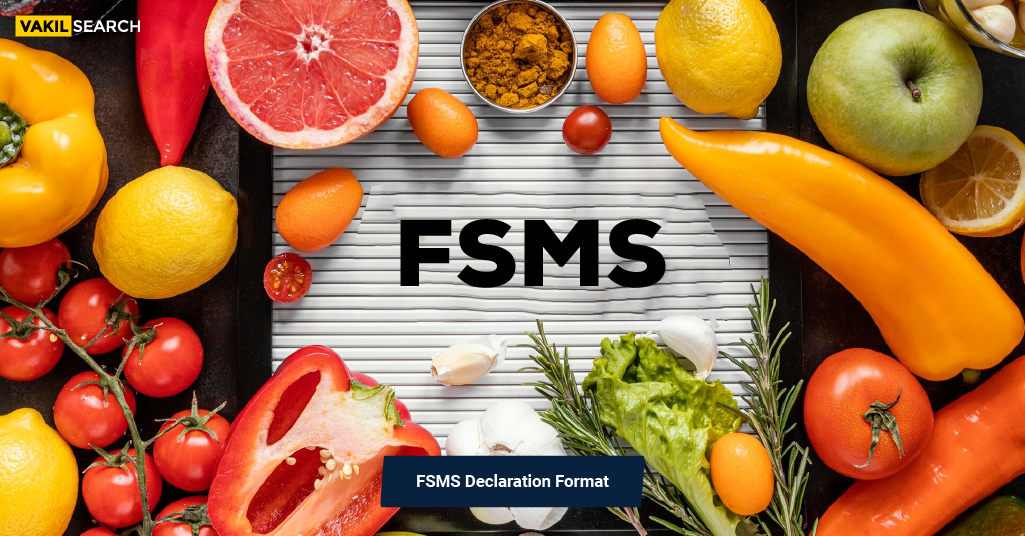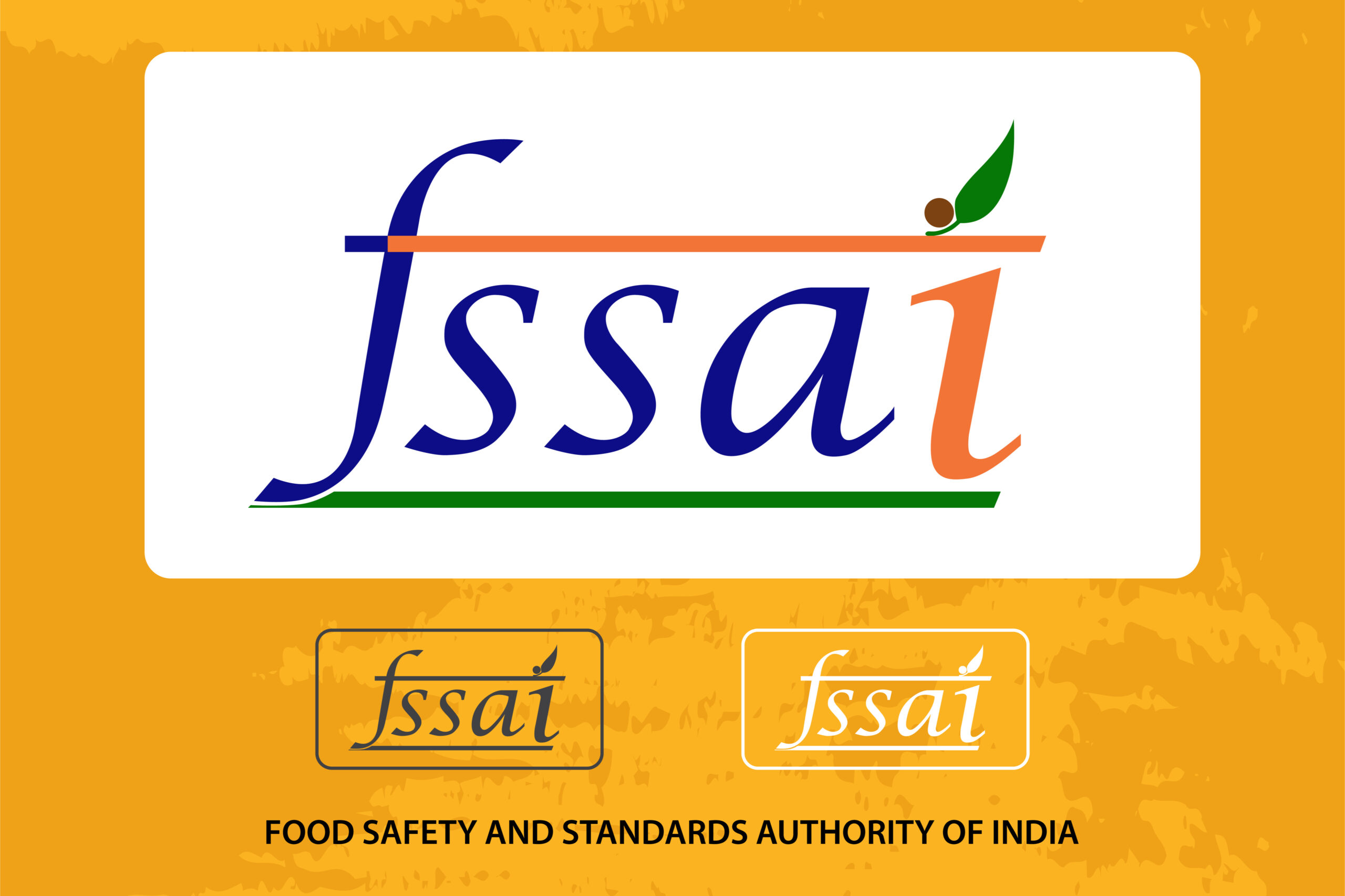New food business? FSMS declaration key for licenses. Download a simple format, understand requirements, and avoid delays.
In India, anyone involved in food handling (manufacturing, processing, packaging, or distribution) needs an FSSAI license or registration. This process requires a crucial document called an FSMS declaration, acting as an essential annexure to your application.
Why is it mandatory? The FSS Act 2006 demands every food business operator (FBO) to have a pre-designed FSMS plan before applying for a license. Missing this plan can lead to application rejection.
Food Safety Management System Plan (FSMS)
A Food Safety Management System (FSMS) plan is a roadmap that outlines the procedures and processes a food business implements to ensure the safety of its products. It’s like a blueprint for preventing foodborne illness and ensuring compliance with food safety regulations.
Why is an FSMS plan important?
- Protects Consumers: By proactively identifying and controlling hazards, you can prevent foodborne illnesses and protect the health of your customers.
- Boosts Brand Reputation: Consumers are increasingly conscious of food safety. Having a well-implemented FSMS plan demonstrates your commitment to safety and builds trust in your brand.
- Improves Operational Efficiency: FSMS plans help streamline processes, reduce waste, and improve overall operational efficiency.
- Complies with Regulations: Many countries have mandatory food safety regulations, and an FSMS plan can help you demonstrate compliance.
- Preliminary Information: This section includes details about your business, such as name, address, and type of food operation.
- Hazard Analysis: Identify potential hazards (biological, chemical, physical) that could occur throughout your food chain, from receiving ingredients to serving the final product.
- Critical Control Points (CCPs): These are the specific steps in your process where you can control the identified hazards to prevent them from causing harm.
- Critical Limits: Define the acceptable range for each CCP, such as temperature, time, or pH level.
- Monitoring Procedures: Describe how you will monitor each CCP to ensure it remains within critical limits.
- Corrective Actions: Outline the steps you will take if a CCP deviates from its critical limit.
- Verification Procedures: Regularly verify that your FSMS plan is effective in controlling hazards.
- Record Keeping: Maintain accurate records of all monitoring and verification activities.
Developing an FSMS Plan
The specific documents required under an FSMS may vary depending on the nature of the food business, applicable regulations, and standards being followed. There are various resources available to help you develop an FSMS plan, including, Get in touch with our experts at Vakilsearch and get a hassle-free process:
- Government agencies: Many food safety regulatory agencies offer guidance and templates for developing FSMS plans.
- Industry associations: Trade associations often provide resources and best practices for implementing FSMS in specific sectors.
- Consultants: You can hire qualified consultants to help you develop and implement an FSMS plan tailored to your business.
Documents Covered Under FSMS
- FSMS Plan:
- The cornerstone document outlining the entire food safety management system.
- Details the processes and procedures in place to ensure food safety.
- Includes hazard analysis, critical control points (CCPs), critical limits, monitoring procedures, corrective actions, verification procedures, and record-keeping.
- FSMS Flowchart:
- A visual representation of the food production process from start to finish.
- Helps identify potential hazards and CCPs.
- Facilitates understanding of the overall flow of food operations.
- Inspection Checklist:
- Used to assess compliance with FSMS requirements during internal and external audits.
- Covers aspects such as hygiene, sanitation, pest control, temperature control, and product traceability.
- Hazard Analysis Worksheet:
- A tool for identifying and evaluating potential food safety hazards.
- Consider biological, chemical, and physical hazards.
- Assists in determining CCPs and critical limits.
- Standard Operating Procedures (SOPs):
- Detailed, step-by-step instructions for performing specific tasks related to food safety.
- Cover areas such as cleaning and sanitising, personal hygiene, food handling, and storage.
- Training Records:
- Documentation of employee training on food safety procedures.
- Includes training topics, dates, and attendees.
- Monitoring Records:
- Documents the results of monitoring activities at CCPs.
- Includes measurements, observations, and corrective actions taken.
- Corrective Action Records:
- Documents actions taken to address deviations from critical limits or other food safety issues.
- Includes the problem, corrective action taken, and verification of effectiveness.
- Verification Records:
- Documents activities undertaken to verify that the FSMS is working effectively.
- Includes internal audits, external audits, and review of monitoring and corrective action records.
- Other Relevant Documents:
- Supplier approval documentation
- Product specifications
- Complaint records
- Recall procedures
- Regulatory compliance records
Requirement for FSMS Plan
- Regulatory Compliance:
- Mandatory in India: The Food Safety and Standards Act, 2006 (FSS Act) mandates all food businesses in India to have an FSMS plan, regardless of size or type.
- International Standards: Many countries have regulations aligning with international food safety standards, such as those set by the Codex Alimentarius Commission, that often necessitate FSMS plans.
- Food License/Registration:
- FSSAI in India: An FSMS declaration is a mandatory part of the application for an FSSAI license or registration in India.
- Other Regulatory Bodies: Similar requirements often exist for obtaining food licenses or permits from regulatory bodies in other countries.
- Customer Requirements:
- Large Retailers and Food Service Providers: Many large retailers and food service providers often require their suppliers to have FSMS plans in place to ensure food safety throughout the supply chain.
- Consumer Confidence: Having an FSMS plan can demonstrate a commitment to food safety and build trust with consumers, who are increasingly conscious about food safety issues.
- Best Practices:
- Industry Standards: Even when not strictly mandated by law, having an FSMS plan is considered a best practice for food businesses to ensure consistent food safety standards.
- Risk Management: It’s a proactive approach to identifying and controlling food safety hazards, reducing the risk of foodborne illnesses and protecting consumers.
- Global Trade:
- Facilitating Trade: An FSMS plan can be essential for businesses involved in global food trade, as many importing countries have strict food safety requirements.
- Demonstrating Compliance: It can help demonstrate compliance with international food safety standards, promoting access to global markets.
- Nature of Food Business: The specific requirements for an FSMS plan may vary depending on the nature of the food business, the types of products involved, and the level of risk associated with the operations.
- Applicable Standards: Businesses may also choose to implement FSMS plans based on specific food safety standards, such as ISO 22000 or FSSC 22000, to further enhance their food safety management practices.
FSMS Declaration
An FSMS Declaration is a crucial document in the process of obtaining a Food Safety and Standards Authority of India (FSSAI) license or registration in India. It serves as a formal commitment by your food business to implement a Food Safety Management System (FSMS) and comply with relevant food safety regulations.
What is it?
- A written statement declaring your intent to establish and maintain an FSMS.
- Includes details about your food business, such as name, address, type of food operation, and applicable food safety regulations.
- Outlines your commitment to implementing specific food safety practices, such as hazard analysis, critical control points (CCPs), and corrective actions.
Why is it important?
- Mandatory for FSSAI license/registration: Without an FSMS declaration, your application will be rejected.
- Demonstrates food safety commitment: Shows your dedication to ensuring the safety of your food products and protecting consumers.
- Prevents foodborne illnesses: By proactively identifying and controlling hazards, you can reduce the risk of food contamination and outbreaks.
- Boosts brand reputation: Consumers increasingly value food safety. Having an FSMS plan and declaration demonstrates your commitment and builds trust.
What are the elements of an FSMS declaration?
- Applicant information: Your name, designation, and contact details.
- Business information: Name of your food business, address, type of food operation, and applicable FSSAI license/registration category.
- Food safety commitment: Declare your commitment to implementing an FSMS plan that complies with FSSAI regulations and relevant food safety standards.
- Declaration of FSMS plan development: State that you have developed an FSMS plan and will implement it before your license/registration is issued.
- Undertaking for FSMS certification: Commit to getting your FSMS plan certified by an accredited agency once such agencies are notified by the FSSAI.
FSSAI Registration or License
What is FSSAI?
- The Food Safety and Standards Authority of India (FSSAI) is the apex food regulator in India, established under the Food Safety and Standards Act, 2006.
- Its mission is to ensure the safety and wholesomeness of food consumed in India, and to promote public health through the regulation and supervision of food safety.
Why is FSSAI Registration or License Required?
- Mandatory for all food businesses: Any person or entity involved in any stage of food manufacturing, processing, packaging, storage, transportation, distribution, or sale in India is required to obtain an FSSAI license or registration.
- Ensures food safety: The FSSAI licensing process aims to uphold food safety standards, protect consumers from foodborne illnesses, and promote responsible food business practices.
Types of FSSAI Licenses/Registrations:
- Basic Registration: For small food businesses with an annual turnover of less than Rs. 12 lakhs.
- State License: For food businesses operating within a single state, with a turnover exceeding Rs. 12 lakhs.
- Central License: For food businesses operating in multiple states or importing food products.
Application Process:
- Choose the appropriate license category.
- Register online on the FSSAI portal (FoSCoS) or apply offline.
- Fill in the application form and upload required documents.
- Pay the application fee.
- Schedule an inspection (if applicable).
- Receive your license/registration certificate.
Documents Required:
- Business registration certificate
- Identity and address proof of the owner
- List of food products handled
- Details of manufacturing/processing facilities
- Food Safety Management System (FSMS) declaration
Benefits of FSSAI Registration/License:
- Legal compliance: Ensures your business operates legally within the food industry.
- Consumer trust: Demonstrates commitment to food safety, building consumer confidence.
- Business expansion: Allows for expansion of business operations across states and potential for export.
- Brand reputation: Enhances brand image and reputation for quality and safety.
Creating an FSMS Declaration
- Download the format:
- Obtain the official FSMS declaration format from the FSSAI website:
- Alternatively, find reputable online resources offering templates.
- Fill in the required details:
- Applicant information: Your name, designation, and contact details.
- Business information: Name of your food business, address, type of food operation, and applicable FSSAI license/registration category.
- Food safety commitment: Declare your commitment to implementing an FSMS plan that complies with FSSAI regulations and relevant food safety standards.
- Declaration of FSMS plan development: State that you have developed an FSMS plan and will implement it before your license/registration is issued.
- Undertaking for FSMS certification: Commit to getting your FSMS plan certified by an accredited agency once such agencies are notified by the FSSAI.
- Sign and submit:
- Sign the declaration and submit it along with your FSSAI license/registration application.
What is an FSMS Plan?
An FSMS plan is a comprehensive document outlining the procedures and processes your food business implements to ensure food safety. It serves as a roadmap for preventing foodborne illnesses and complying with food safety regulations.
- Preliminary Information: Business details (name, address, type of operation).
- Hazard Analysis: Identification of potential hazards (biological, chemical, physical).
- Critical Control Points (CCPs): Specific steps to control hazards.
- Critical Limits: Acceptable ranges for each CCP (temperature, time, pH).
- Monitoring Procedures: Monitoring CCPs to ensure they remain within limits.
- Corrective Actions: Steps to take if CCPs deviate from limits.
- Verification Procedures: Regular validation of FSMS effectiveness.
- Record Keeping: Maintaining accurate records of monitoring and verification activities.
Sample of an FSMS Plan
(Example for a Biscuit Manufacturing Unit)
| Step | Hazard | Control Measure | Critical Limit | Monitoring Procedure | Corrective Action |
| Receiving raw materials | Contamination with microorganisms | Inspect for damage, pests, and proper temperature | No visible damage, pests, or temperature abuse | Visual inspection, temperature checks | Reject damaged or contaminated materials |
| Mixing ingredients | Cross-contamination | Use clean and sanitised equipment | Equipment cleaned and sanitised according to SOP | Visual inspection, swab testing | Reclean and sanitise equipment |
| Baking biscuits | Incomplete cooking, survival of pathogens | Ensure proper baking temperature and time | Internal temperature of biscuits reaches 165°F for 15 seconds | Temperature probes, time monitoring | Extend baking time or discard undercooked biscuits |
| Packaging and storage | Contamination from environment | Package biscuits in clean, sealed containers. Store in cool, dry conditions | No signs of damage or contamination | Visual inspection of packaging and storage conditions | Repackage or discard damaged or contaminated products |
Process Flow Chart FSMS Plan
A process flow chart in the context of an FSMS plan outlines the sequence and steps involved in the production or handling of food products. It visually represents the flow of materials, information, and actions through the different stages of the food production process. In the context of a Food Safety Management System, the flow chart is crucial for identifying potential hazards, critical control points (CCPs), and ensuring that food safety measures are integrated into each step of the process.
- Raw Material Reception: Where and how raw materials are received.
- Processing Steps: Detailed steps involved in the production or processing of food.
- Critical Control Points (CCPs): Points in the process where control measures are essential to prevent, eliminate, or reduce hazards.
- Quality Control: Measures to ensure the quality of the final product.
- Storage and Distribution: How finished products are stored and distributed.
Inspection Checklist FSMS Plan
An Inspection Checklist in the context of an FSMS plan is a tool used to systematically evaluate and verify that food safety practices and procedures are being followed. It helps in ensuring compliance with regulatory requirements, industry standards, and the organisation’s internal protocols. The checklist is usually designed to cover key aspects of food safety, hygiene, and quality control.
The Inspection Checklist for an FSMS plan may include items such as:
- Personal Hygiene: Ensuring that personnel follow proper hygiene practices.
- Sanitation and Cleaning: Verifying that cleaning and sanitation procedures are followed.
- Temperature Control: Checking that food storage and processing temperatures are within safe limits.
- Cross-Contamination Prevention: Ensuring measures are in place to prevent cross-contamination between raw and cooked foods.
- Record-Keeping: Verifying that required records related to food safety are accurately maintained.
Standard Format of Inspection Checklist FSMS Plan
The specific format of an Inspection Checklist within an FSMS plan can vary based on the organisation, industry, and regulatory requirements. However, a standard format often includes:
- Identification Information: Date, time, location, and individuals involved.
- Checklist Items: A list of items or criteria to be inspected.
- Compliance Status: Columns or checkboxes to indicate whether each item is compliant or not.
- Comments/Remarks: Space for additional notes or comments on specific observations.
- Signature/Approval: Signature of the inspector or responsible personnel, indicating approval or completion.
Role of the FSMS Declaration:
- Commitment to Compliance: The declaration typically includes a statement expressing the organisation’s commitment to comply with food safety regulations, standards, and any other relevant requirements.
- Responsibility Acknowledgment: It may outline the responsibilities of the organisation in ensuring the safety and quality of its food products. This could include the commitment to implementing and maintaining an effective FSMS.
- Continuous Improvement: The declaration might emphasise the organisation’s dedication to continuous improvement of its FSMS, indicating that it will review and update procedures to enhance food safety practices over time.
Other Information in the Declaration:
- Scope of the FSMS: Clearly defining the scope of the Food Safety Management System, including the processes and activities covered by it.
- Key Personnel: Identifying key personnel responsible for implementing and maintaining the FSMS. This may include the food safety team, management representatives, and other relevant individuals.
- Training and Competence: Indicating the commitment to providing training and ensuring the competence of personnel involved in food safety-related activities.
- Communication: Addressing how the organisation communicates internally and externally regarding food safety matters, including procedures for handling complaints or feedback.
- Documentation and Record-Keeping: Stating the commitment to maintaining accurate and up-to-date documentation related to the FSMS and keeping records as required by applicable standards.
Conclusion:
The conclusion of your FSMS declaration serves as a powerful statement of your organization’s dedication to food safety. It’s an opportunity to:
- Reiterate unwavering commitment: Underscore your prioritization of food safety as a fundamental principle within your organization.
- Demonstrate compliance: Highlight your adherence to all relevant regulations and standards.
- Embrace continuous improvement: Express your ongoing commitment to refine and strengthen your FSMS over time.
To further solidify your intent, consider including:
- Signatures: Official signatures from key management representatives, signifying their personal accountability for food safety.
- Endorsements: Endorsements from external parties, if applicable, can add further credibility and confidence.
Navigating Specific Requirements:
Remember, the specifics of your FSMS Declaration will depend on the standards or regulations you follow. Popular frameworks like ISO 22000 and other regional food safety standards have their own unique requirements.
Finding the Right Guide:
For the most accurate and up-to-date information, seek out the specific guidelines or requirements stipulated by the relevant food safety standard or regulatory body in your region. Consulting these official sources ensures your declaration fully meets all expected criteria.
In essence, the concluding remarks of your FSMS declaration are a chance to declare your unwavering commitment to food safety, showcase your dedication to compliance, and express your continuous pursuit of excellence in your food safety management system. Get in touch with Vakilsearch FSSAI registration expert and know more!
FAQ
What is a Food Safety Management System (FSMS)?
An FSMS is a framework that outlines all the procedures, policies, and processes a food business implements to ensure the safety of its food products at every stage, from farm to fork. This includes activities like hazard identification, risk assessment, critical control point (CCP) management, monitoring, corrective actions, and recordkeeping.
Why is an FSMS important?
An FSMS is crucial for several reasons: Protecting consumer health: It minimizes the risk of foodborne illness outbreaks by proactively identifying and mitigating hazards throughout the food chain. Compliance with regulations: FSMS aligns with national and international food safety regulations, helping businesses avoid legal issues and fines. Building trust and brand reputation: Implementing a proactive FSMS demonstrates a commitment to food safety, enhancing customer confidence and brand image. Improving efficiency and cost savings: Preventing foodborne illness outbreaks avoids product recalls, rework, and reputational damage, leading to cost savings.
What are the benefits of having an FSMS?
Some key benefits of an FSMS include: Increased food safety: Reduced risk of contamination and foodborne illness. Enhanced compliance: Easier to meet regulatory requirements. Improved operational efficiency: Streamlined processes and better resource allocation. Cost savings: Reduced losses from recalls and rework. Boosted customer confidence: Building trust and loyalty through commitment to food safety.
Who needs an FSMS?
All businesses involved in food handling, from farms and manufacturers to distributors, restaurants, and retailers, require an FSMS. The complexity of the system may vary depending on the size and nature of the business, but even small operations need basic food safety measures.
What is the difference between an FSMS and a HACCP plan?
HACCP (Hazard Analysis and Critical Control Points) is a specific methodology used within an FSMS. It focuses on identifying and controlling critical points in the food production process where contamination is most likely to occur. An FSMS provides a broader framework that encompasses HACCP alongside other food safety elements like sanitation, training, and traceability.
What are the legal requirements for FSMS?
While specific requirements may differ by country or region, many countries have implemented mandatory FSMS regulations based on Codex Alimentarius, an international food safety standard. Businesses should familiarize themselves with their local regulations and ensure their FSMS complies with all relevant requirements.









